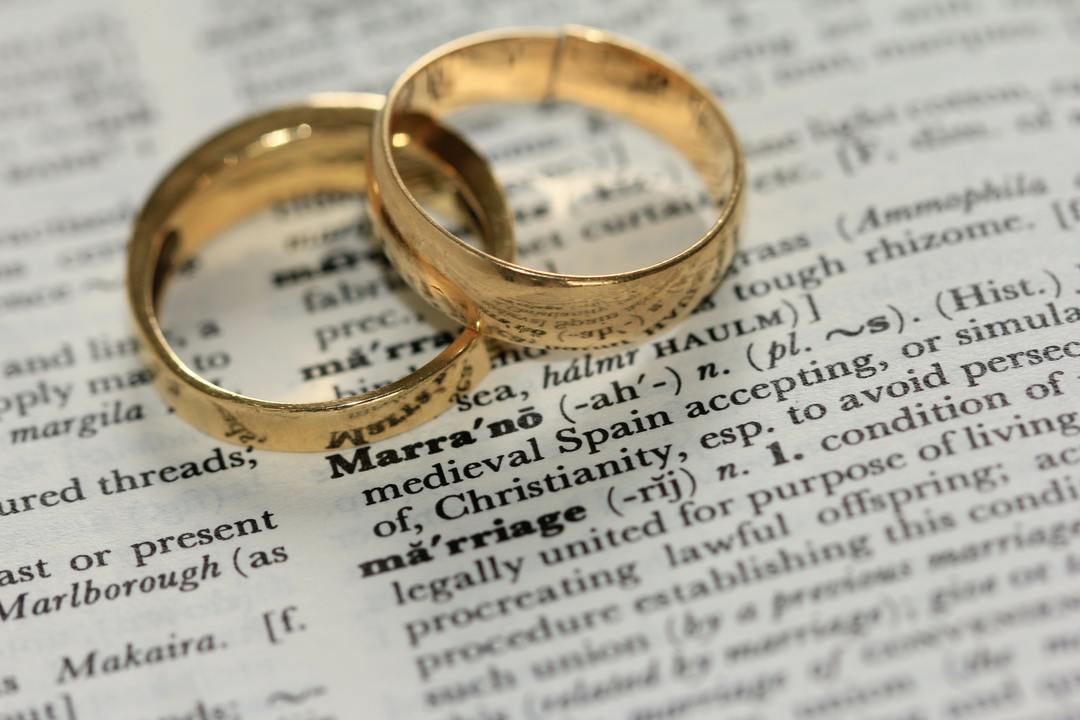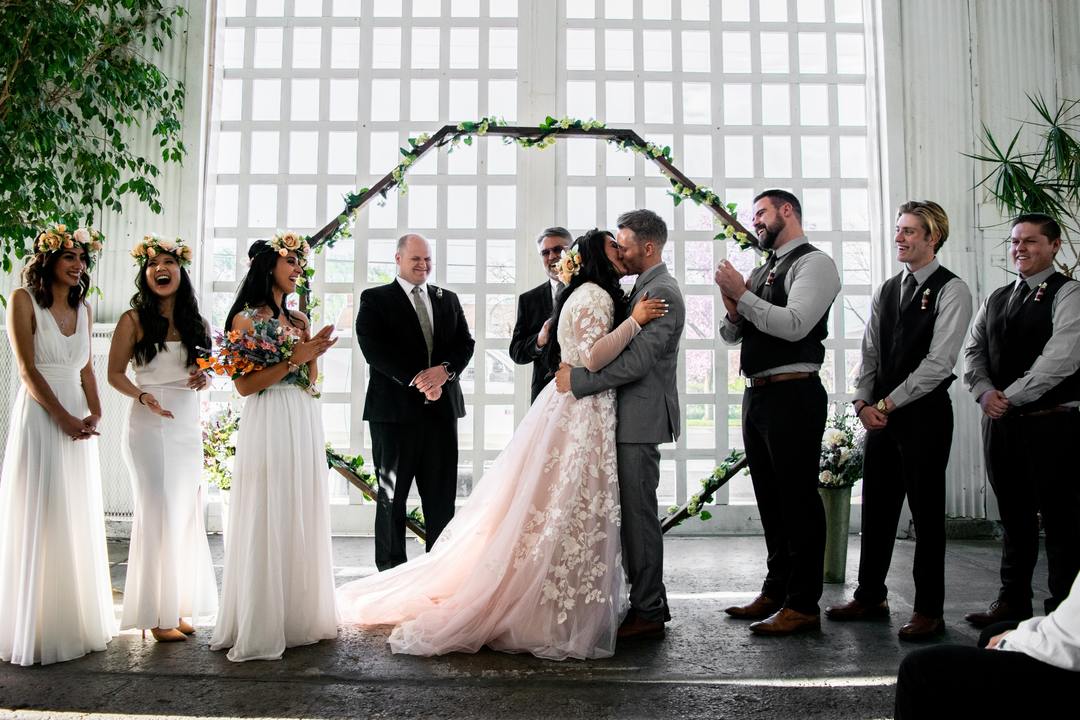- Expert advice/
- Wedding planning 101/
- Wedding planning questions/
- How Long Should Wedding Vows Be?
- Wedding planning questions
How Long Should Wedding Vows Be?
Don’t know how long your vows should be on your special day? Discover the average wedding vow length, and more, with this comprehensive guide.
Last updated February 5, 2024

No matter how prepared you are in other aspects of wedding planning, wedding vow writing is one that, understandably, yields a lot of questions. It makes sense: It’s a deeply personal endeavor, so making sure you do them right can feel daunting.
Whether you’re utilizing traditional phrases or writing your own set from scratch, one of the biggest questions couples have is about the length of the vows. Should they be a few sentences—or multiple pages? Is there anything you legally need to say? How do you frame your vows, so they come from the heart but don’t cause your guest’s eyes to glaze over?
Here’s what you need to know to write—and recite—your promises with ease on your big day.

How Long Should Wedding Vows Be?
On average, wedding vows should last somewhere between 30 seconds and three minutes. While ultimately this is your time to share your feelings with your future spouse, if you have wedding guests in attendance, it’s important to be mindful of the time. While that average time frame might seem short, when you’re standing in front of an audience, it will feel much longer.
After you’ve both penned drafts, have a friend or family member read them to make sure they’re generally the same length. That way one of you doesn’t say just a few sentences, while the other recites four pages. If you have more to say (and aren’t having an elopement), consider writing each other notes to read on the day-of, or recite private vows before the wedding ceremony. Extra bonus? This may help alleviate any “pre-aisle” jitters, plus it makes for some extra-special first look photos.
Agree on a Format and Tone
Before writing your individual (or collaborative) vows, chat about what type of vibe you’re hoping to accomplish. Do you want to really lay on the romance or keep things a little more light-hearted and humorous? Either way, make sure to acknowledge the importance of the commitment you’re making.
Once you know your tone, select a format that feels right for your wedding ceremony and relationship. Decide how you’d like to present your vows by choosing one of the following common formats or crafting your own:
- Write individual, personal vows and share them in turn.
- Have the wedding officiant read a phrase you wrote together, then repeat it back, either in turn or in unison.
- Have the officiant read phrases/questions you wrote together and each person, in turn or in unison, answers with either “I do” or “I will.”
Research, Research, Research
While vows are often utilized in various religious rituals, they’re not legally required for a marriage service or elopement. So, technically, you don’t need them if you don’t want them (but you do need to make sure to accomplish all the legal tasks like obtaining the marriage license, declaring your intent, and being proclaimed married by your officiant). Additionally, vows aren’t a part of many traditional ceremonies. Depending on your affiliation or house of worship, there may or may not be a predetermined set of vows—and there may even be no vows at all.
Once you know your format and whether or not you want to write your own vows, it’s time to find your inspiration. Revisit your favorite movies and songs, read poetry, look up vow examples, and don’t be afraid to take bits and pieces from different places to craft vows that reflect your unique bond.

Include Three Important Components
If you’re stuck on what to say or how to pull it all together, try to hit on the following three components to create memorial marriage vows:
Your Love Story
Whether it started with a right swipe or an old-fashioned meet-cute, everyone’s love story is unique. While many of your wedding guests might know the gist, now’s a great time to either tell it again or touch upon some of the moments in your relationship that brought you to your wedding day. While you don’t need to spend ten minutes outlining every detail (feel free to put that on the wedding website), an antidote or two is a great way to touch upon how you got to your wedding day.
The Future
After talking about the past, another great option is to talk about your plans for the future (and your promise to stand by either other despite what the coming years may bring). Do you plan to have children? Travel the world? Take up new hobbies or adopt a whole pack of pets? Talk about what you hope the rest of your life looks like and how you plan to support each other in the face of the unknown.
Your Promises
Technically, vows are promises. While the love story and the future is romantic, make sure to include some actual vows in your speech. The best combination is a mix of serious (like promising to take care of each other when you’re sick) and less intense (like never watching the next episode of your show without the other). Whatever you choose, make sure you’re only making promises you can actually keep. It might seem like this is just a three-minute speech, but in reality, these are the real vows you’re making for the rest of your life. Make them count—and then make sure to adhere to them.
Fine-tune and Practice
After you write your vows for your future spouse, the work isn’t done quite yet. Edit them down to stick within the time frame and consider eliminating any really obscure nicknames or antidotes, so your guests aren’t scratching their heads. Once you feel good about what you’ve written, practice saying it aloud. The more comfortable you are with it, the better prepared you’ll feel for reciting it on the big day. If you’re familiar with the words and flow, you’ll be able to glance into your beloved’s face during the big moment instead of just staring at your paper.
Be in the Moment
Finally, when the time comes to say your marriage vows to your partner on your wedding day, all that matters is that it comes from the heart. Forget the guests and just tell your almost-spouse how you feel. When you look back on the moment, it doesn’t matter how perfect your sentence structure was or exactly how long your vows lasted. All that really matters is that you said what you needed to say before starting on the next chapter of your love story.
- Expert advice/
- Wedding planning 101/
- Wedding planning questions/
- How Long Should Wedding Vows Be?
Find even more wedding ideas, inspo, tips, and tricks
We’ve got wedding planning advice on everything from save the dates to wedding cakes.